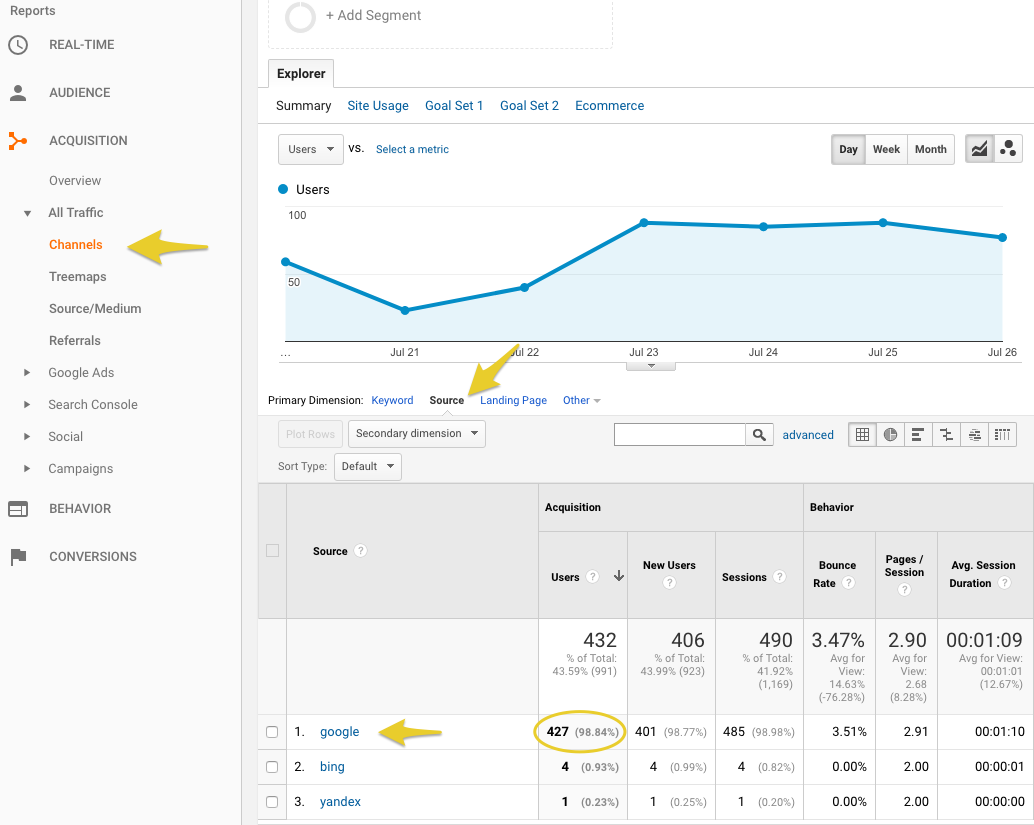Set Up for SEO Success
This blog was updated in March 2020. Please contact us should you have any questions.
Search Engine Optimization (SEO) Success
Effective Search Engine Optimization (SEO) can involve a variety of tactics. These tactics usually include technical & on-page SEO tactics, and off-page tactics like link building.
Doing the fundamental principles of technical and on-page SEO are key to ranking well over time. Addressing the fundamentals helps to elevate your domains overall search visible — the primary goal of SEO.
Laying the Foundations for Effective SEO
SEO is very data driven. So, the first key to an effective SEO strategy is setting up the SEO tools you’ll use to measure, monitor and improve your SEO.
There are many SEO tools on the market. Start with the core tools before you start purchasing subscriptions to more enhanced tools.
Two basic, but important tools are: Google Analytics, and Google Search Console. Both these tools are free and provide critical data about your site’s performance.

Google Analytics
Google Analytics gathers a wealth of data about your website. Specifically it will gather important data about the Organic Search traffic. You can also look specifically at the key pages organic users are landing on.
This data is directly related to your search engine optimization efforts. You will be able to measure and monitor traffic to your SEO pages. You’ll be able see Organic Search channel performance, like traffic volumes, user engagement metrics and how this channel is doing in terms of website goals.
Google Search Console
Google Search Console is also free. It helps you monitor the overall technical health and performance of your site — the things that impact indexing and crawling.
Google Search Console is also very useful for keyword research. You can generate a query report. This shows you the actual keywords people have searched on in Google that have resulted in a page of content showing up in the Google search results.
About Keywords
Organic search is still very keyword driven. Most of us still use Google search by putting a query into Google.Even with voice search is on the rise , you’re still likely to be using a keyword.
Keyword research is a key part of a successful SEO strategy. Start by generating a list of keywords you want to target. Next, map those keywords to your content. Now you’ll be able to use those keywords to optimize your content. To make a successful campaign pay close attention to these key areas:
Over-optimization of content. Keyword stuffing can put a domain on the wrong side of Google. You don’t have to follow a magical keyword density formula — just use keywords naturally.
Most importantly, think of your users. How can you use keyword placement to make their experience of the content optimal.
Tip: Read your content aloud. If the content is “stuffed” full of keywords you’ll be able to hear it right away.
Tip: Use keyword variations. Use variations of the primary keyword, like plural or synonyms, and other terms that support the topic or ideas behind the primary keywords. For example, if the primary keyword, or main topic of the page is ‘network monitoring’, a keyword that might support that can be ‘infrastructure performance data’.
Tip: Google Suggest, Google Keyword Planner, and communities like Quora, or Reddit are great for researching variations of keywords people are searching for.
On-site SEO Optimization
Your digital experience is about the user, and so is the on-page SEO, but it is also about the search engine. To improve your site’s rankings, provide a clear signal to the search engine what your content is about.
Page URLs
While Google prefers shorter URLS, try to use keywords in your URL as this will help to:
Tell the search engine what the target keyword is
Make the URL more descriptive when searchers are scanning the search results page
Page Title
Page Titles as it relates to SEO are very important. They are still a ranking signal and effective Titles can help users choose to click on your result.
Use the target keyword in the Title
Keep it 55-65 characters long
Meta Description
While this SEO element doesn’t impact ranking, it does have an impact on click-through-rates from the search results page. It serves to help inform people what your page is about. It even can help to entice them to click through.
Use the target keyword in the Meta Description
Be descriptive, and provide useful information
Keep it 150-160 characters long
H1 Tags
H1 tags are typically the primary heading on a content page. They play an important role in SEO. They also help to draw the user in and help guide them through your content. Heading in general makes the content more scannable.
Use the target keyword in the H1
Use supporting keywords in the other headings (H2, H3 etc)
Image Alt Tags
Images are often returned right in the main Google search results. Give important pages a useful alt tag to help Google understand what they are, and why they are important.
Image Alt tags also help the realm of accessibility
Internal Links
Linking content pages together creates crawling paths for search bots and are an excellent means of funnelling users to a conversion goal.
Use relevant keyword in the anchor, or linking text
Avoid using generic terms like ‘click here’, or ‘learn more’
For more information on the importance of technical SEO visit another article on this subject:
Technical SEO: The Most Important Tactic
While SEO keeps evolving, it is important that you lay a solid foundation for success - that starts with Technical SEO.
Main Photo by Thor Alvis on Unsplash




